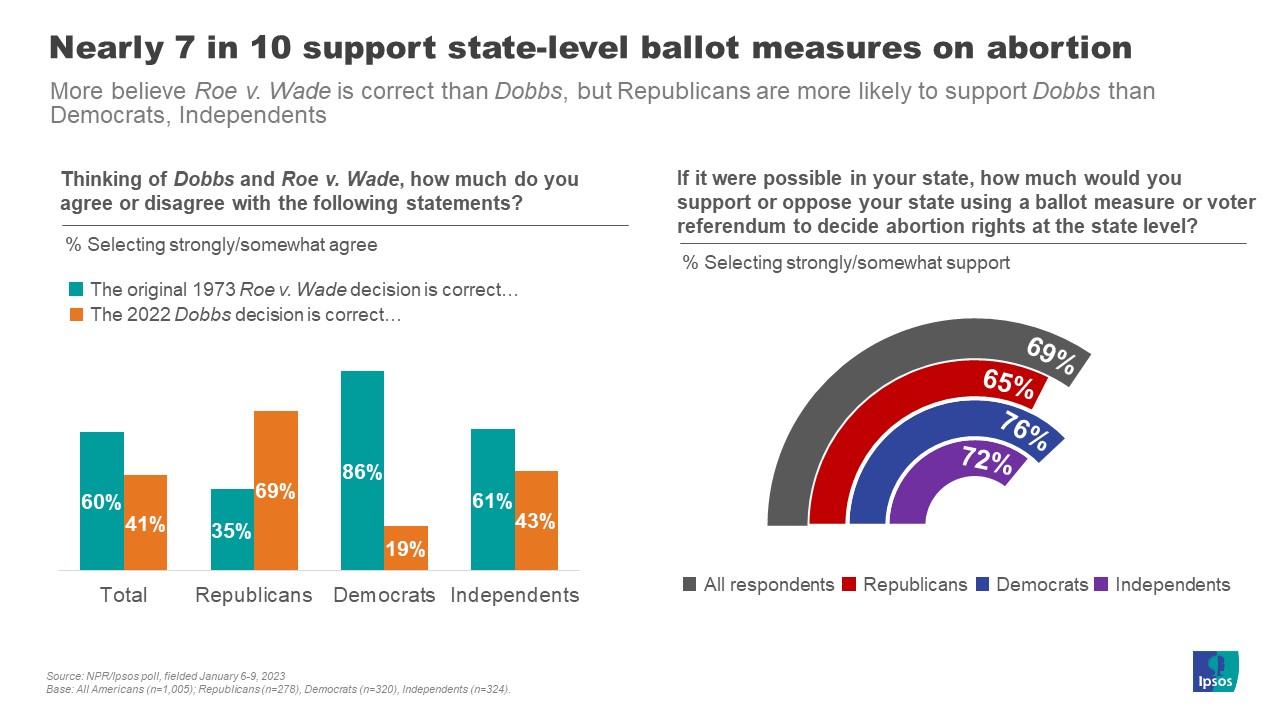Nearly 7 in 10 support state-level ballot measures on abortion
Washington, D.C., January 22, 2023 – Six months since the landmark Dobbs decision, a new NPR/Ipsos poll finds that while most Americans say abortion should be legal in most cases, two in five say they support the Supreme Court’s decision to overturn Roe. Agreement with the right to abortion is split along party lines, with Democrats more likely to be in favor of abortion rights and Republicans more likely to oppose them. However, during what would have been the 50-year anniversary of Roe, nearly seven in ten Americans, regardless of party, say they would support a state-level ballot measure or voter referendum to decide abortion rights at the state level. If a voter referendum was held, Americans say 2 (54%) to 1 (27%) that they would vote to establish legal abortion. Since Dobbs, three in ten Americans say accessing abortion care has gotten harder in their state. At the same time, many Americans hold misconceptions or are uninformed about key facts surrounding abortion.

For more information on this poll, please click here.
Detailed Findings
1. More Americans agree with the 1973 Roe v. Wade decision than with the 2022 Dobbs v. Jackson Women’s Health Organization decision, but agreement is split along party lines.
- About two in five (41%) agree that the Dobbs decision was correct, while three in five (60%) say they believe the original 1973 Roe v. Wade was correct to protect abortion rights.
- While seven in ten (69%) Republicans agree with Dobbs, only 19% of Democrats and 43% of independents say the same. Meanwhile, only 35% of Republicans agree with Roe, compared to 86% of Democrats and 61% of Independents.
- Around three in five (62%) Americans say they believe the Dobbs decision was based more on politics than the law. Republicans (39%), however, are less likely to say so than Democrats (86%) or independents (66%).
2. Nearly half of Americans are dissatisfied with how state legislatures have handled abortion, and a vast majority, regardless of party, say they would support a state-level ballot measure or voter referendum to determine state-level abortion rights.
- About half of Americans disapprove (49%) of how their state lawmakers handled abortion in their state over the last year. Discontent is consistent across party lines, as 47% of Democrats, 50% of Republicans, and 49% of independents say they do not approve.
- Seven in ten (69%) say they would support their state using a ballot measure or voter referendum to decide state-level abortion rights, rather than letting state legislators decide.
- This majority support for ballot measures or voter referendums is consistent across party lines, with support from 76% of Democrats, 72% of independents, and 65% of Republicans.
3. Although most Americans are in favor of letting voters decide on abortion rights, they are split across party lines on whether they would support or oppose abortion if given the choice.
- Half (54%) of Americans say they would vote in favor of abortion legality at the state level, compared to only 27% saying they would vote against abortion.
- Republicans are more likely to say they would side against abortion legality (56%), while Democrats are more likely to say they would vote in favor of abortion (81%).
- In general, a quarter (26%) believe abortion should be legal in all cases; a third (34%) believe it should be legal in most cases; three in ten (28%) believe it should be illegal in most cases; one in ten believe it should be illegal in all cases (9%).
- Democrats are more likely to believe abortion should be legal in all or most cases (84% compared to 32% of Republicans); Republicans are more likely to believe abortion should be illegal in most or all cases (66% compared to 15% of Democrats).
4. In the past six months since Dobbs, many Americans say accessing abortion care in their state has gotten harder. This number is higher for Americans who live in states where abortion is illegal or unprotected.
- Nearly three in ten (28%) say the ability to access abortions has become harder now compared to six months ago, while only 5% say they think abortion access has become easier. The majority (63%) think access to abortions has stayed about the same.
- In states where abortion is not legal or protected, about two in five (44%) say access to abortion has gotten harder. In contrast, only 6% of Americans say the same in states where abortion is legal or protected.
- Since Dobbs, about 3% of Americans report that they or someone they know have travelled across state lines to access abortion services. Alternatively, about 9% say they or someone they know underwent a long-term birth control procedure, and about 6% say they or someone they know delayed getting pregnant.
5. Finally, many Americans are incorrect or uninformed about facts surrounding abortion.
- When asked key questions about abortion facts and trends, at least a third of Americans say they don’t know the answer to each question.
- Although the majority of Americans (56%) can correctly identify that most abortions occur in the first three months of pregnancy, fewer than half respond correctly to each of the other three questions.
- Only two in five (39%) correctly say the majority of women getting abortions are not teenagers. About half (48%) say they don’t know, and 12% answer incorrectly.
- Just three in ten (30%) Americans report knowing that a fetus does not have a strong chance of survival outside of the womb at 20 weeks. More say they don’t know (45%), and one in five (23%) give an incorrect response.
- While only one in five (19%) correctly say that the number of abortions has declined since the 1980s, more give an incorrect response (28%) or just say don’t know the answer (53%).
About the Study
These are the findings of an NPR/Ipsos poll conducted January 6-9, 2023, by Ipsos using our KnowledgePanel®. This poll is based on a nationally representative probability sample of 1,005 general population adults aged 18 or older. The sample includes 278 Republicans, 320 Democrats, and 324 Independents.
The survey was conducted using KnowledgePanel, the largest and most well-established online probability-based panel that is representative of the adult US population. Our recruitment process employs a scientifically developed addressed-based sampling methodology using the latest Delivery Sequence File of the USPS – a database with full coverage of all delivery points in the US. Households invited to join the panel are randomly selected from all available households in the U.S. Persons in the sampled households are invited to join and participate in the panel. Those selected who do not already have internet access are provided a tablet and internet connection at no cost to the panel member. Those who join the panel and who are selected to participate in a survey are sent a unique password-protected log-in used to complete surveys online. As a result of our recruitment and sampling methodologies, samples from KnowledgePanel cover all households regardless of their phone or internet status and findings can be reported with a margin of sampling error and projected to the general population.
The study was conducted in English. The data were weighted to adjust for gender by age, race/ethnicity, education, household income, Census region, metropolitan status, and 2020 vote choice. The demographic benchmarks came from the 2022 March Supplement of the Current Population Survey (CPS). The 2020 vote choice benchmarks came from the Federal Election Commission’s Official 2020 Presidential General Election Results.
- Age (18-29, 30-44, 45-59, 60+) by Gender (Male, Female)
- Race/ethnicity (White, Non-Hispanic; Black, Non-Hispanic; Other/2+ races, Non-Hispanic; Hispanic
- Education (Less than High School, High School graduate, Some College, Bachelor or higher)
- Household Income (Under $25,000; $25,000-$49,999; $50,000-$74,999; $75,000-$99,999; $100,000-$149,999; $150,000 and over)
- Census Region (Northeast, Midwest, South, West)
- Metropolitan Status (Metro, non-Metro)
- 2020 Vote Choice (Biden, Trump, All other/Did not vote)
The margin of sampling error is plus or minus 3.6 percentage points at the 95% confidence level, for results based on the entire sample of adults. The margin of sampling error takes into account the design effect, which was 1.16. The margin of sampling error is higher and varies for results based on sub-samples. The margin of sampling error for the Republicans is plus or minus 6.5 percent, with a design effect of 1.22. The margin of sampling error for the Democrats is plus or minus 6.7 percent, with a design effect of 1.49. The margin of sampling error for the Independents is plus or minus 6.3 percent, with a design effect of 1.33. In our reporting of the findings, percentage points are rounded off to the nearest whole number. As a result, percentages in a given table column may total slightly higher or lower than 100%. In questions that permit multiple responses, columns may total substantially more than 100%, depending on the number of different responses offered by each respondent.
About Ipsos
Ipsos is the world’s third largest market research company, present in 90 markets and employing more than 18,000 people.
Our passionately curious research professionals, analysts and scientists have built unique multi-specialist capabilities that provide true understanding and powerful insights into the actions, opinions and motivations of citizens, consumers, patients, customers or employees. We serve more than 5000 clients across the world with 75 business solutions.
Founded in France in 1975, Ipsos is listed on the Euronext Paris since July 1st, 1999. The company is part of the SBF 120 and the Mid-60 index and is eligible for the Deferred Settlement Service (SRD).
ISIN code FR0000073298, Reuters ISOS.PA, Bloomberg IPS:FP www.ipsos.com



